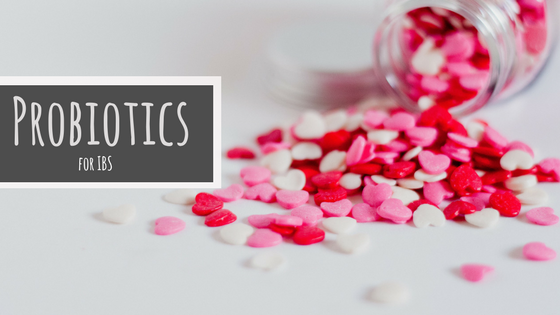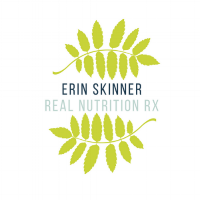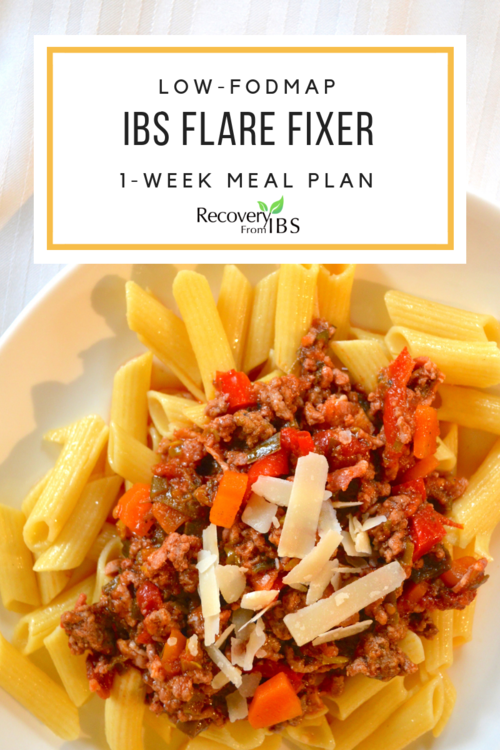Probiotics for IBS – A Pro’s Guide to Getting Started

You’ve heard it before – probiotics for IBS can help to ease your digestive woes. It sounds great until….the deciding. SO many products, types, brands, and confusing market. They all have conflicting claims and arguments on the label. The price.
Ugh, you hate the idea of (literally) flushing money down the toilet.
Well, set your fears aside. If you suffer from IBS symptoms like gas, bloating, pain, cramping, diarrhea, constipation, and/or reflux, this is the post for you. Here’s the bottom line on probiotics for IBS!
What are Probiotics?
Probiotics are bacteria that can be taken orally. They are usually the same forms as those found in our microbiome (the colony of bacteria that naturally resides in our colon). Taking probiotics for IBS (Irritable Bowel Syndrome) is a common way that people try to improve their digestive problems. Unfortunately (and contrary to popular opinion), probiotics do not actually ‘colonize’ your gut. They provide a benefit as they pass through, but need to be taken continually in order to provide continuous benefit.
Benefits of Probiotics
The bacteria serve a variety of functions such as to:
- Reduce inflammation
- Help to ‘fight off’ less beneficial bacteria
- Produce beneficial by-products (short-chain fatty acids) such as butyrate, which help to nourish and heal the gut lining
- Improve mood (related to the above by-products)
- Improve intestinal permeability or ‘leaky gut’
- Reduce the amount of gas produced in the intestinal tract
- Regulate the immune system
Pretty impressive, right?
However, it’s important to keep something in mind….
IBS can have a variety of causes.
These root causes include:
- Small intestinal bacterial overgrowth (SIBO)
- Altered gut motility (i.e. slowed due to adhesions or vagus nerve damage)
- Reduced enzyme production and/or absorption (i.e. of lactose or fructose)
- Increased gut sensitivity
- Dysbiosis (imbalance) of the microbiome (i.e. fungal/candida overgrowth or skewed proportions of bacteria types)
Choosing a Probiotic for IBS
So, you can probably guess where this is going – different types of probiotics can help with different problems! So, understanding your ‘root cause’ can help you select the most helpful probiotic.
Overall, the literature shows that probiotics improve IBS about 50% of the time. It can take some trial and error to find the dose and strains that actually improve symptoms.
So, what I recommend starting with is a product that has multiple strains (i.e. 8+), mostly from the Bifidobacterium and Lactobacillus strains. Start with just 1/10th of the product recommended dose, and work up slowly to a therapeutic dose per your tolerance.
A good therapeutic dose is 25 billion CFU (colony forming units), and some people increase their dose up to 50 billion CFU per day to get the full benefit. Some probiotics actually go even higher (such as VSL #3), but make sure that you’re working with a healthcare professional before you go to a very high dose.
Some species that have specifically been shown in clinical trials to improve IBS for some patients include:
- Bifidobacterium infantis
- Bifidobacterium breve
- Bifidobacterium longum
- Bifidobacterium animalis
- Lactobacillus Plantarum
- Lactobacillus fermentum
- Lactobacillus acidophilus
- Lactobacillus paracasei
- Lactobacillus rhamnosis
The quality of the product is extremely important – make sure to prick a product WITHOUT prebiotics (fibers), as those can exacerbate IBS! Also, ensure your product is gluten/soy/dairy-free (hypoallergenic). Powders and vegetable caps are usually the safest with regard to fillers, extra fibers, and contaminants.
An example of this is Klaire Labs LactoPrime Plus.
Or, another example is Seeking Health ProBiota Sensitive
These are great first products to try.
What about Histamine?
Yes, there’s an exception to every rule! Some people are sensitive to histamine, which is produced by some of the bacteria in probiotics. On the other hand, some probiotic bacteria help to degrade histamine. If you know that you are histamine sensitive, or if you have a lot of allergic symptoms, it’s best to start with a product that has fewer strains. For example, the specific strain lactobacillus rhamnosus GG (must have the GG!) is histamine degrading. Try finding a few products that have just 1-2 strains that you tolerate. Rotating those products every 1-2 weeks.
What about Spore-Based?
Spore-based (or soil-based) products contain bacteria and/or yeast that is actually derived from soil and that doesn’t necessarily match the bacteria in the naturally-occurring human microbiome. They have limited scientific evidence, but many clinicians report good results from them.
I do use spore-based probiotics in my practice, but usually after first trying more traditional probiotics. I find that people are often sensitive to them and that they don’t seem to be as helpful with IBS as traditional products. However, the occasional client will have great results from these, so it’s worth a try if you’ve struggled to tolerate or see results with other products. Two examples of these are Prescript-Assist and MegaSpore Biotic. PrescriptAssist was recently reformulated, so keep that in mind if you are considering it based on information or results from 6+ months ago. You can get more details here.
Probiotic Sourcing
Probiotic sourcing is extremely important. Don’t order your probiotics from Amazon! It’s full of counterfeit products, and products that have either expired or been temperature-abused. This is especially problematic for probiotics, which often require refrigeration. Instead, get your probiotics directly from the producer, or from a trusted distributor. A healthcare professional can set you up with good products from good sources so that you don’t waste your money on poor quality (or damaged) products!
How to Take Probiotics
Once you’ve sourced a good product, it’s time to give it a try! Make sure that you refrigerate it, even if it says shelf stable. If you’re traveling, it’s OK to keep a shelf-stable product out of refrigeration.
Always make sure to take your probiotic WITH food. The meal will lower your stomach acid, and will help the probiotic bacteria to survive further into your GI tract.
Start with just a small fraction of the dose (i.e. 1/4th or all the way down to 1/10th), and slowly increase each day per your tolerance. If you end up taking more than around 25 billion CFU per day, I recommend splitting the dose across multiple meals.
Give a new probiotic several weeks before you judge the effect – tracking your symptoms can be a helpful way to know if you’re getting a benefit from it.
Conclusion
Ok, that’s a lot to think about for now!
Bottom-line:
- Get a clean, well-sourced product (get help with this if you need to)
- Dose up slowly
- Experiment to find something that works, but be patient – give it a few weeks to really assess if you’re seeing improvement.
- It can help to track your symptoms before starting and at 2 and 4 weeks in to see if there’s a change.
- Don’t get discouraged if you don’t have luck with the first one you try. Sometimes it takes several tries, and some people never have luck with probiotics.
- Knowing the root cause of your IBS can really help with selecting the best product. You can learn more about finding your root cause from my IBS Recovery 101 Series.
- An experienced healthcare professional can definitely help make this process easier and less confusing.
I hope that this helps, and I’d love to hear your questions! You can post a comment to this post or contact me directly. Also, don’t miss my free Flare-Fixer Meal Plan:
Bonus!
If you have IBS or digestive woes, don’t miss my FREE flare fixer meal plan.
It’s your ticket to try Low-FODMAP (done right) without having to figure it all out first.
It’ll have you feeling better inside of a week!
Warm regards,

Erin
P.S. Curious if we’re a fit for 1:1? Contact me HERE to set up a free chemistry call!

